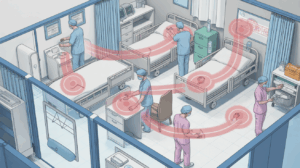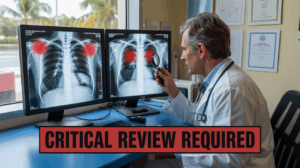
When you take medication, you trust that it’s the right drug, the correct dose, and that it will not harm you. Unfortunately, medication errors are a common type of medical mistake that can cause serious injuries, hospitalizations, or even death.
If you experienced unexpected symptoms or complications after taking a prescribed drug, you may be wondering whether a medication error is to blame. Recognizing the signs that a medication error happened is the first step toward holding your care team accountable. A Fort Lauderdale medical malpractice lawyer can help you pursue compensation for negligence.
What Is a Medication Error?
A medication error occurs when a preventable mistake happens during the prescribing, dispensing, or administration of a drug. It doesn’t necessarily require intent, as many errors result from carelessness, miscommunication, or lack of proper oversight.
These errors can involve the wrong drug, incorrect dosage, or even mixing medications that shouldn’t be taken together. While some mistakes cause mild side effects, others can lead to severe or permanent harm.
Common Causes of Medication Errors
Medication mistakes can happen at several stages of the treatment process. Some of the most common causes include:
- Prescribing the wrong medication: A doctor may write a prescription for the wrong drug due to confusion between similar names or failure to check a patient’s medical history.
- Incorrect dosage: A nurse or pharmacist may provide a higher or lower dose than intended, leading to ineffective treatment or overdose.
- Failure to consider allergies: If a healthcare provider doesn’t check for known allergies, the patient may experience a dangerous reaction.
- Mislabeling or packaging errors: When a pharmacy mislabels a container or mixes up medications, patients may take the wrong drug entirely.
- Failure to monitor reactions: Some drugs require ongoing monitoring, such as checking blood levels or organ function. Skipping these steps can result in avoidable harm.
- Communication failures: Miscommunication between doctors, nurses, and pharmacists often plays a major role in medication errors, especially during shift changes or hospital discharges.
Signs That a Medication Error Happened
If something feels off after starting a new prescription or changing a dosage, pay close attention. The following signs may suggest that a medication error occurred:
- Unexpected or severe side effects: If you experience symptoms that your doctor didn’t warn you about (such as dizziness, rashes, breathing problems, or confusion), it could mean you received the wrong medication or dosage.
- Worsening of your condition: When your original symptoms get worse instead of better, it may be a sign that the prescribed drug is ineffective or incorrect.
- New health complications: If you develop new health issues, such as liver or kidney problems, high blood pressure, or sudden fatigue, it might be due to a medication interaction or overdose.
- Allergic reactions: Swelling, itching, hives, or difficulty breathing may indicate you were given a drug you are allergic to, or one that contains an ingredient similar to a known allergen.
- Medication appearance mismatch: If the pills or packaging look different from what you usually receive, it could be a dispensing or labeling error.
- Confusion or unusual behavior: Some drugs can cause neurological or psychological symptoms if dosed improperly. Confusion, agitation, or disorientation can all point to a possible mistake.
If you notice any of these signs, stop taking the medication until you have spoken with a medical professional.
What to Do If You Suspect a Medication Error
Discovering a medication mistake can be alarming, but quick action can help you minimize the harm. Here’s what to do:
- Seek medical attention: If you are experiencing severe symptoms, go to the emergency room or call 911. Bring your medication with you so doctors can identify the problem
- Report the incident to your provider: Let your doctor or pharmacist know what happened and when you started noticing symptoms. This information can help clarify the source of the error.
- Keep detailed records: Write down your symptoms, medical visits, and any communications you have had with healthcare providers. These records may be critical if you decide to pursue a legal claim.
- Do not discard the medication: Keep the medication and packaging. They may serve as important evidence of what went wrong.
Who Can Be Held Liable for a Medication Error?
Determining who’s responsible for a mistake with medication depends on where and how the error happened. Several parties could be legally liable, including:
- Doctors: A doctor may be at fault for prescribing the wrong drug, failing to check for allergies, or not monitoring for side effects.
- Pharmacists: A pharmacist can be liable for filling a prescription incorrectly, mixing up labels, or dispensing the wrong dose.
- Hospitals or clinics: Facilities may share responsibility if poor communication, understaffing, or lack of training contributed to the mistake.
- Nurses or other healthcare workers: A nurse who administers the wrong medication or dosage could also be held accountable.
Your lawyer can review medical records, pharmacy logs, and provider notes to determine where the breakdown occurred.
How a Medical Malpractice Lawyer Can Help
If you were harmed because of a medication error, a medical malpractice lawyer can help you understand your legal options and seek fair compensation. More specifically, they can:
- Investigate the cause: An attorney can review your medical records, prescriptions, and pharmacy data to find out how and where the error occurred.
- Consult medical experts: A lawyer can work with experts who can testify about proper medical standards and whether your provider violated them.
- Handle communication with insurers: A lawyer can deal with insurance companies on your behalf to protect your rights and prevent low settlement offers.
- Pursue compensation: An attorney can help you recover damages for medical bills, lost wages, pain and suffering, and other losses.
- Provide legal representation: If your case goes to court, a lawyer can represent you and fight for accountability and justice.
Possible Compensation in a Medication Error Case
If a medication mistake caused you harm, you may be entitled to compensation for:
- Medical expenses: You can recover costs for hospital stays, additional treatments, and future medical care.
- Lost wages: You can claim income you lost during your recovery or from long-term disability caused by the error.
- Pain and suffering: You can seek compensation for the physical and emotional toll of your injury.
- Loss of enjoyment of life: You can recover damages if the mistake permanently affects your quality of life.
Speak to a Medical Malpractice Attorney
Medication errors are preventable, and when they happen, someone should be held accountable. If you believe you were harmed because of a mistake in prescribing, dispensing, or administering a drug, a medical malpractice lawyer from Anidjar & Levine can help you file a claim and recover damages. You pay nothing unless we recover compensation for you.
Schedule a free case review to find out how you can get the compensation you deserve.










